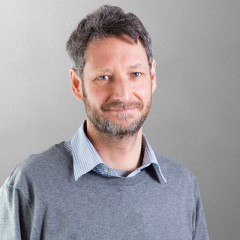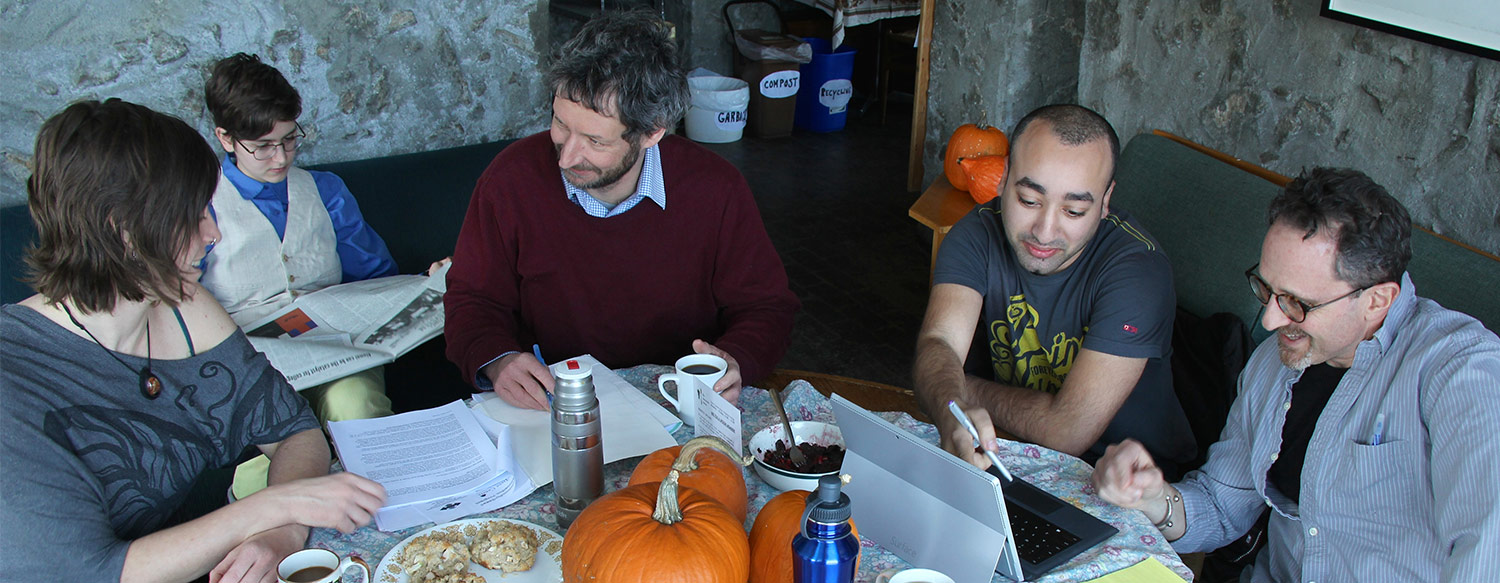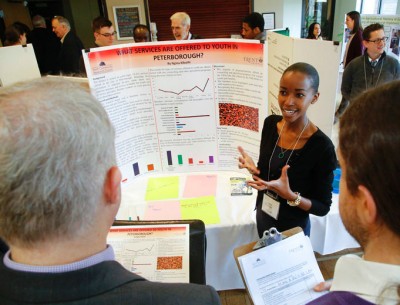In CFICE’s “Conversations With” series, we interview community-campus engagement (CCE) practitioners to get their insights on CCE. Interview conducted by Erin Martel, CFICE Communications Research Assistant.
This month, we hear from John Marris, Executive Director of the Trent Community Research Centre (TCRC). John brings a wealth of community research and teaching experience to the Centre, where he applies it to building relationships between the Peterborough community and Trent University faculty and students. John explores the ways the TCRC is helping to shape community engagement in Peterborough, and the challenges that the TCRC faces in ensuring community remains the heart of all the research projects brokered through the TCRC.
In your present role, what does being community-first mean to you?
 It means that all of our projects start with a community partner initiating the project. Community-first means being responsive to the research needs of the community and keeping these needs as our focus. The primary assessment of the success of a project is ‘has it met the community’s needs?’ Therefore, we do not take on any research project that starts with academic intellectual curiosity. However, this is not always a perfect model. Sometimes our own staff, faculty or students have great ideas for project that would benefit the community and we’re not always responding to those ideas in the most open ways. Although our community-first model insures us against the problem that the academy knows what’s good for the community, there can be something limiting about a pure community-first model.
It means that all of our projects start with a community partner initiating the project. Community-first means being responsive to the research needs of the community and keeping these needs as our focus. The primary assessment of the success of a project is ‘has it met the community’s needs?’ Therefore, we do not take on any research project that starts with academic intellectual curiosity. However, this is not always a perfect model. Sometimes our own staff, faculty or students have great ideas for project that would benefit the community and we’re not always responding to those ideas in the most open ways. Although our community-first model insures us against the problem that the academy knows what’s good for the community, there can be something limiting about a pure community-first model.
Is there any way the TCRC can help to change the way that academic institutions serve communities?
There is no formal structure for us to approach the message of “this is what we mean by community-first”. However, my ideal for Trent University would be, and I think this would apply elsewhere as well, that students who are coming into a research-based project have completed a short course in what community-based research is, the methods that might be involved and what it means to be sensitive to a community’s needs. Although in terms of student learning and student personal development, there is typically a very strong alignment between community interest and student interest. Often times, the student personal development and learning come from the delivery of something that’s genuinely useful to the community. I would also like to see faculty complete some kind of certification in community-engaged scholarship before they supervise students on projects.
How can you maintain communication channels when working on a project?
We set a very straightforward rule for students: “you will copy us on every email.” So that I’m hopefully aware when a community partner or faculty or somebody in the process is heading in a direction that might need some support. If I cannot in my head summarize where a project is at, then I send out an email. It’s not rocket science, its emails and meetings.
What are the most exciting challenges that you are faced with in working with community and academic partners?
The exciting thing is the possibilities of the research question. When you have a community partner come to you with a research project and say “I really need to know this” and you see that there is a fascinating, exciting project for students that is very achievable—and you can think of great faculty who can take this on and be excited by it. That is the absolute joy of the work.
Students come to you and say “I just got a job because I put this on my resume,” or community groups come to you and say “we just got funding to buy a generator, so our turtles won’t die if the power goes out.” That’s when you know it’s worthwhile and a good number of our projects have those success stories.
Are there additional best practices you would like to mention?
Listening is obviously the key thing for good campus-community relations. There is something about learning to be present in a community situation and respecting the idea that a community or local organisation is a likely expert on their issues. I think that is vitally important.
Not everything can be solved with academic research. There’s lots of stuff that comes to us that just isn’t appropriate for the academy, because not everything can be solved in the academy. It is very easy to pick up an idea from the community and become excited about how it could work in the university, but are you really listening to what’s being asked? There are projects that people propose to us and I think “wow, that would be really exciting for students, but you know what it’s not going to get you to where you need to go” and we need to kind of walk away from the idea.
Making sure that you are supporting the students in doing the best work they possibly can rather than setting them a hurdle to jump over. Genuinely support students. Don’t play hardball with them in the way that academia has a tradition of doing. You know, saying “keep going until you’ve failed and I will tell you how you’ve failed.” That’s not going to help the community.
You have to in some sense be an activist in the community to do this work in order to know what the issues are. My colleagues and I all sit at various community tables. We get out into the community and are a part of what’s developing here in Peterborough.
Is there anything else that should be mentioned about the role of community engagement professionals and how they can be more community-first?
The university should put more money into this work. The university is an incredibly secure, empowered and strong body. So there is an obligation, from my perspective, that the university uses some of that resource, be it financial, be it time, for the benefit of the community. You know, Trent is the second largest employer in Peterborough I believe, and its salaries are off the scale compared to anyone in the non-profit sector. So it’s a case of that power being put to use for the community.

